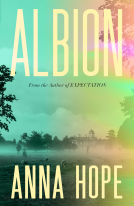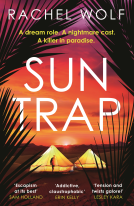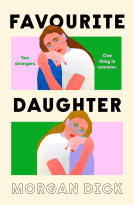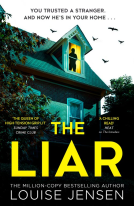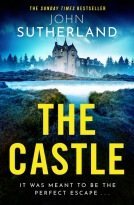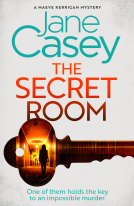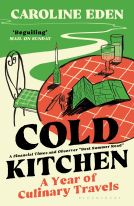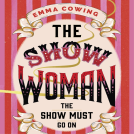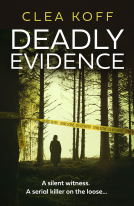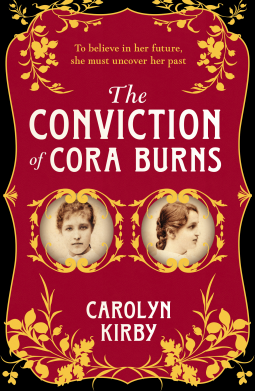
The Conviction of Cora Burns
by Carolyn Kirby
This title was previously available on NetGalley and is now archived.
Send NetGalley books directly to your Kindle or Kindle app
1
To read on a Kindle or Kindle app, please add kindle@netgalley.com as an approved email address to receive files in your Amazon account. Click here for step-by-step instructions.
2
Also find your Kindle email address within your Amazon account, and enter it here.
Pub Date 21 Mar 2019 | Archive Date 15 Jul 2019
Oldcastle Books | No Exit Press
Talking about this book? Use #CoraBurns #NetGalley. More hashtag tips!
Description
'Downton Abbey meets Elizabeth Gaskell' - GJ Minett
To believe in her future, she must uncover her past.
Birmingham, 1885. Born in a gaol and raised in a workhouse, Cora Burns has always struggled to control the violence inside her. Haunted by memories of a terrible crime, she seeks a new life working as a servant in the house of scientist Thomas Jerwood. Here, Cora befriends a young girl, Violet, who seems to be the subject of a living experiment. But is Jerwood also secretly studying Cora…?
With the power and intrigue of Laura Purcell’s The Silent Companions and Sarah Schmidt’s See What I Have Done, Carolyn Kirby’s stunning debut takes the reader on a heart-breaking journey through Victorian Birmingham and questions where we first learn violence: from our scars or from our hearts.
Advance Praise
'The Conviction of Cora Burns is a striking debut. Rich in gothic darkness and period detail, the brutality of Victorian Britain is exquisitely drawn. A beautifully-written story which enveloped me from first page to last' - Amanda Jennings, author of Cliff House and In Her Wake
'Downton Abbey meets Elizabeth Gaskell' - GJ Minett, author of Lie In Wait, The Hidden Legacy and Anything For Her '
An intriguing story of loss, doubleness, and sinister scientific experiment. Carolyn Kirby conjures up the nineteenth-century in a way that will surely satisfy all devotees of “Vic-lit”' - Gaynor Arnold, author of Girl In A Blue Dress
'In a novel that deftly illustrates so many social horrors, Kirby delivers a complicated picture of Cora that defies easy Characterization ... The suspicion and risk that permeate Cora’s few choices reveal the disproportionate power accorded to the wealthy and to men, even when their deeds display wanton inhumanity' - Letitia Montgomery-Rodgers, Foreword Magazine
'A fascinating and evocative journey through the heartbreaking secrets of Cora's past, and a memorable exploration of nature versus nurture' - Rachael Edwards, author of Darling
'Kirby's talent shines through her deft prose...I think this is a fantastic novel from an incredibly exciting new voice. I think fans of Sarah Waters would love this bold debut' - Emily Elgar, author of If You Knew Her
'An assured debut - atmospheric, dark and emotive. The story is sure to stay with readers long after turning the final page' - Sam Carrington
'Carolyn Kirby creates an unforgettable character in the spirited and fascinating Cora Burns. The voice transports us to the world of late nineteenth century Birmingham and we are drawn into Cora's dark mystery from the first page. A truly haunting and original début' - Jacqui Lofthouse, author of 'Bluethroat Morning' and 'The Modigliani Girl'
'A poignant reflection on the possibility of personal redemption and the potential within each person and society, to recognize and cherish human dignity and shed the injustices of the past' - Alice Hatcher author of The Wonder That Was Ours
'Carolyn Kirby is a born storyteller - a Charles Dickens for the 21st century' - Jay Neugeboren, Author of Imagining Robert and The Stolen Jew
'Carolyn Kirby’s unforgettable debut is a painstaking, kaleidoscopic, deeply unsettling, deeply thrilling, expansive, provocatively masterful novel' - Charles Blackstone, author of Vintage Attraction
'Kirby’s superb psychological thriller just about garrotes you in suspense. Is violence a product of nature or nurture? Can we shape who we are, and once shaped, can we ever change?' - Caroline Leavitt, author of Pictures of You and Is This Tomorrow
'A gripping historical thriller with a compelling protagonist. I loved the period detail and can't wait to read more from Carolyn Kirby' - Sarah Ward, Author of the DC Childs novels
Available Editions
| EDITION | Hardcover |
| ISBN | 9780857302946 |
| PRICE | £12.99 (GBP) |
Links
Featured Reviews
 Kay W, Reviewer
Kay W, Reviewer
Thank you to the publishers and NetGalley for this advanced copy. This is a hauntingly dark book and one that draws you in from the very first page. I thoroughly enjoyed it and have no hesitation in recommending it.
I was completely intrigued and enthralled by Cora's complex and twisty story and highly recommend it to lovers of historical fiction.
Reminiscent of Jane Harris' The Observations. My full review will be published on my blog as part of the Blog Tour to which I consider myself privileged to have been invited.
This was a strange and arresting novel that expertly highlighted the chasms between classes, the have and have-nots, and also details the processes in which we can drive ourselves crazy, or are driven crazy.
Cora is a hard to like character, but it doesn't affect my wanting to know more about her. I felt for her, and even though she came across a mite sociopathic, I still rooted for her solving her mysteries.
The writing could be a little tighter in places - my attention wandered at times and I feel some distinction needs to be made clearer between thoughts and actions and speech. I'd also cut down and shorten the 'letters' part - I wanted to get back to Cora!
Recommended for fans of asylums in the earlier part of the twentieth century (and who isn't?!).
 Kath B, Reviewer
Kath B, Reviewer
Cora Burns has to be one of the most interesting characters I have read about for a while. Born to a convict in Birmingham gaol she didn't have the best start in life. Moving from there to grow up in a workhouse, incarcerated in gaol herself, before being released to make her own way in life. A path that takes her on the most interesting journey when she eventually winds up working for scientist Thomas Jerwood. But is there more to this appointment than on first viewing? As she befriends Violet, a young girl who appears to be the subject of Jerwood's experiments, she starts to see a bigger picture emerge. Is it really just coincidence that she ended up there, or is there something much more duplicitous going on?
This is a book that can be read on many levels. There is the main story which is intriguing and captivating in itself and the book can be satisfying just on that basis. But then there are layers, one of which skirts the whole nature/nurture thing but isn't really something I can divulge much about here for fear of spoilers. There is so much going on, both morally and ethically that I firmly believe that this book would raise some great debate and would make a great book club read.
The plot is quite convoluted but it is tightly crafted and so very well executed that, although I did spend quite a bit of time in a fog of confusion, there was enough intrigue to hold me captive util such time as the truth eventually all came out.
It's funny how you can be more forgiving of a character when you know where they came from. Even though Cora did some very wicked things along the way, I couldn't help feeling both sympathy and empathy for her and I managed to get an emotional connection pretty much from the off. Especially with regard to the way she desperately tried to find her childhood friend Alice. Characters have to be strong in a character driven book such as this one and every one was so well drawn and each played their parts to aplomb.
The time and place depicted in the book were also very well described. Set in the 1880s, the author manages to get across the feeling of poverty and affluence that divided people in these times. I'm not overly familiar with this time but everything I read felt real and it is obvious that the author has done their research.
When I finished the book, completely satisfied by the way, I did the usual and went to check the author's back catalogue. Shocked was an understatement when I found out that this is the author's debut novel, such was the quality of what I had read. If this is the standard she has set herself, I really can't wait to see what she has in store for her next book. My thanks go to the Publisher and Netgalley for the chance to read this book.
 Viv R, Reviewer
Viv R, Reviewer
I really enjoyed The Conviction of Cora Burns by Carolyn Kirby. I liked the way the story was interlinked with 'extracts' from a medical journal which shone light on the thinking of the day around nature versus nurture. Having studied psychology I was particularly interested in this. Highly recommended!
 Reviewer 534102
Reviewer 534102
I was intrigued and captivated by this book. Cora Burns faces a constant struggle against her own emotions and the circumstances she finds herself in, in an 1800s society where attitudes to poor women are at best pitying and misguided and at worst, dangerous and malicious. The author never takes the ‘easy’ option of having a man rescue Cora, which I was pleased to see. She’s often not a sympathetic character but her flaws are created and magnified by the surroundings she finds herself in. She develops as a person throughout the book, in a believable and interesting way. One plot twist was quite obvious in my opinion, but only added to the tension of the novel.
The addition of scholarly articles and journal entries by an asylum doctor are an interesting layer to the overall story and help to set the action in a social and medical context.
A dark book that is full of mystery and questions. The reader gains an insight into 1900 century laws, women’s prisons, workhouses and mental asylums, issues and problems that are not often aired. Cora, the heroine, has a very complicated character but this is understandable after the misery and degradation she had suffered. This book is different in that Cora shares her innermost thoughts with the reader. Thoughts that are not pleasant, thoughts that should not be shared. Again and again I was astonished by what was going through her head and her actions. Cora stop this is not the way things are done but if you have no guidance or shown no love how would you behave.
I was unable to put this book down and I was rewarded by the amazing climax.
 Diane D, Reviewer
Diane D, Reviewer
A debut novel by Carolyn Kirby and I’ll be interested to read more by this author. Just love a historical novel that gives you a sense of living in the era it’s set in, namely Birmingham in the 1880’s. A dark almost gothic thriller of a girl Cora Burns born to an unfortunate inmate of a Birmingham gaol, brought up to work in the workhouse, but with a desire to discover the truth about herself. Reminded me of Little Doritt in some ways. Having a love of photography I was particularly interested in the shop just off New Street, an area I’m familiar with. All in all a good read and appears historically factual.
Thanks to Netgalley the author and publishers for a copy of this book.
 Pam S, Reviewer
Pam S, Reviewer
I think it was a story with interesting characters and plot. However, the content was a bit too dark for me. I liked the historical details and intriguing opening of the book. Sometimes, it moved a bit slower to my taste.
But, if you like historical fiction, this is a good book.
Thanks a lot to NetGalley and the publisher for this advanced e-copy in exchange for an honest review.
 Anna C, Reviewer
Anna C, Reviewer
I found this book too disturbing to quite love it, but I think that says more about me than it does about the book. It's well written and (I get the impression) terrifically well researched. It has a lot to say about how little scope for freedom women of the time had; how easily their lives could be destroyed. And about how men of the time saw women and children, particularly those from poor backgrounds, as lesser creatures – fit subjects for experimentation. I felt for Cora and I was glad the book reached the ending it did. Yet at the same time, I could never quite get past the incident from her past, which was truly horrific and meant I wasn't sure if I was even right to want the best for her. In addition, I saw most of the key twists/beats coming. Nevertheless, this is certainly a good book and one that I would recommend to those who like historical fiction with a strong undercurrent of darkness.
 Julie F, Reviewer
Julie F, Reviewer
A book set in the Birmingham area in the late 1800s. A time of poverty and hardship. Cora Burns may have been born in a prison but she will break free from her past. Well written and a very enjoyable read.
 Reviewer 299370
Reviewer 299370
I enjoyed this book. I found it a real page turner and I really wanted to find out more about Cora Burns. It is quite Victorian gothic and Cora is not an easy person to like, she is no paragon. However, given her terrible start in life it's not surprising.
Cora was born to a woman in jail and brought up in the workhouse. She is an outsider and seems unable to make friends until one day a new girl called Alice appears who bonds with her and they spend all their time together and hatch a plan to hurt one of the toddlers. As a result Cora spends much of her time in the infirmary and never sees Alice again. On leaving the workhouse she goes to work in the laundry of the asylum where she has an affair with a stable hand, who shoots off when he realises Cora is pregnant. Cora conceals her pregnancy and gives birth in a laundry room but is caught in the act of trying to strangle her just born child leading to her incarceration. On release she takes up a position as a maud in the house of Mr Jerwood, who studied her brain dimensions and took a photo of her whilst she was in prison. There she meets Violet, a "ward" of Mt=r Jerwood's but all is not waht it seems. Cora has one possession she was given when she left the workhouse, a half piece of a bronze medal that she assumes Alice left for her, but was actually left by her mother and she discovers a box of similar medals in Mr Jerwood's home. What can it all mean? Cora determines to find out.
I think the "conviction" in the title of the novel is not just about Cora's jail conviction but also about the convictions she holds about her own life and how they may be unreliable. If you liked Jane Harris's "Observations" and "Gillespie and I" tand slightly unrelaible narrators hen I think you'd also like this book. I thought the ending was a little rushed and a bit too "neat" but itw as stilla great read.
 Librarian 431790
Librarian 431790
A dark, engaging and entertaining historical thriller.
I liked the plot, the solid mystery and how the characters was developed.
The well researched historical background was rich of details and fascinating.
I will surely read other books by this author.
Highly recommended!
Many thanks to the publisher and Netgalley for this ARC. I voluntarily read and reviewed this book, all opinions are mine.
 ALYSON R, Reviewer
ALYSON R, Reviewer
This book is set in Victorian Birmingham, the narrative switching back and forth between 1865 and "present day" 1885/1886, interspersed with extracts written in medical journals by some of the characters. It tells the story of 20 year old Cora Burns who has had a tough start in life. Born in prison to convict mother Mary Burns, she grows up in the workhouse until a job is found for her at age sixteen in the laundry of the nearby asylum. Cora has always had a violent unpredictable temper which has manifested several times and eventually it lands her in the same prison as she was born in. Never having met her own mother or indeed her father, she is left wondering whether this is something she has inherited or is it a result of her poor and harsh upbringing. And just where did Alice Salt, her childhood friend from the workhouse fit into it all? Upon her release from prison after serving a nineteen month sentence (just for what crime is revealed much later in the book) she is found a place as between maid in a rather strange doctor's house, and she resolves to try to understand what has made her as she is and to fill in the blanks of her past. The only clue she seems to have is a half medal with the words "IMAGINEM SALT" engraved on it and left by her mother. Finding herself in the house of a scientist obsessed with heredity, photography and performing strange experiments only adds to the mystery and confusion that Cora feels. Eventually she discovers pieces of her past with the help of unlikely friends that she makes, and the events of the last twenty years start to unravel and reveal the alarming truth.
This is a difficult book to review without giving away too much of the plot. It is also hard to believe that this is a debut novel except perhaps a feeling at times that the author is trying a little too hard to throw lots in which gets a bit confusing. It is not a quick read and gives plenty of food for thought along the way. There are mysteries to be solved in the book, and the whole story is bound up with the ongoing "nature versus nurture" question, as well as moral dilemmas and the Victorians' interest in understanding and treating diseases of the mind as they perceived them. Having spent much time in the area I was interested to read about places that still exist today and what they were like all those years ago, and it was nice to have a book like this set away from London for a change. The story is fictional but I do believe that there is a great deal of historical accuracy here, and some parts could indeed be the true story of some poor girl living in those times. The ending is definitely satisfying in many ways and overall it was a very enjoyable and challenging read.
 Paromjit H, Reviewer
Paromjit H, Reviewer
The Conviction of Cora Burns is a remarkably accomplished debut from Carolyn Kirby, a gothic piece of atmospherical historical fiction set in the Birmingham of the Victorian era. She relates the story of Cora's life in a narrative that goes back and forth in time, born in prison to a convict, brought up in a workhouse where she forms a friendship with Alice, and works in a asylum. This is a dark and intense emotional roller coaster of a read, with a central character that is flawed and at times her actions make for uncomfortable reading, but the odds are stacked against her, and she fears the violence within herself. She is taken on as a servant by the scientist, Thomas Jerwood, a man interested in studying people and their behaviours. She gets better acquainted with Violet, his ward, and begins to harbour suspicions as to what exactly her role is and of the circumstances in which she came to be employed by Jerwood. This is a story of loss, friendship, identity, intrigue, secrets, and morally questionable science.
Kirby writes a multilayered, complex and well constructed novel with rich descriptions of Victorian poverty, stink, the deeply entrenched class divisions that leave the poor with such few choices, the asylums, and the historical period's morality. Her characterisation is excellent, particularly that of the hard edged Cora, of the trials and tribulations she faced in her life, all of which have helped to shape her into who she is, and the secrets that lie in her past. She is a memorable character, one that will insist on lingering long after the reader has finished reading the novel. I especially liked the way Kirby painted a picture of her interior life, and the debate between nature and nurture. A brilliant read which I recommend to readers interested in this historical period and appreciate the darkest aspects of the time. Many thanks to Oldcastle Books and No Exit Press for an ARC.
 Julie H, Reviewer
Julie H, Reviewer
This was a really interesting read. I really like historical fiction and this story is woven into the poverty of the late 1800s. Cora is an intriguing character and that compelled me to keep reading.
Thank you to Netgalley for my copy.
 Annette J, Reviewer
Annette J, Reviewer
An astonishingly assured historical fiction debut, The Conviction of Cora Burns by Carolyn Kirby is a layered mystery with an almost Gothic flavour. Set in 1880's Birmingham, the book tells the tragic story of Cora Burns, a young woman born to a prisoner in the local women's gaol, who grew up in the workhouse and eventually was sent to work in the local Lunatic Asylum as a laundress., a life of real hardship and deprivation. When ignorance and tragedy combine she finds herself back in the prison, this time as a prisoner and while there she catches the attention of a member of the gentry who is carrying out a pseudo scientific study on the relationship between appearance and predisposition to criminal behaviour. When Cora has served her time he offers her a position as a maid in his household , and it soon becomes clear that he is still studying and observing her, but she may not be the only one.
This book is dark in tone, and it's heroine matches up to that, she is definitely a flawed character, but I would say all the more interesting because of it. The setting is very atmospheric, and the author does not shy away from the more unpleasant aspects of life in that era, particularly for the less well off. By moving between Cora's past and her current situation, we as readers are challenged to question whether nature or nurture lies at the heart of human behaviour, and I think this complicated question is well served by such a complex character as Cora. As the full history of her story is unveiled, it is difficult not to feel some sympathy for her situation.
I read and reviewed an ARC courtesy of NetGalley and the publisher, all opinions are my own.
 Teresa C, Educator
Teresa C, Educator
The Conviction of Cora Burns is the debut novel by Carolyn Kirby, it is a well written historical novel set during the Victorian period. Having read about this period in reasonable depth I found the main character convincing and the period detail made the novel come alive for the reader. Cora’s story is told by going back in time and also through the inclusion of notes from “an eminent scientist” of the day conducting experiments into the theories of nature or nurture.
Cora is born in prison to a convict, she is then sent to the workhouse and from there to work in laundry in the asylum. She ends up in prison herself and on her release she is sent to work in the house of a Thomas Jerwood as a between maid. Here becomes friendly with his young niece, Violet. She soon however begins to question what Jerwood is actually doing and what effects his experiments may have.
Although she encounters many people who take advantage of her and treat her badly there are a few characters who shine through in the way they offer her a way out of her plight. Most notable amongst these is young Mr Thripp from the photographic studio.
The novel, with its flawed central character, is well constructed and reveals the deeply entrenched class divisions and the questionable morality of the way in which the Victorian poor were treated. An excellent and well researched novel which I would recommend it to those who enjoy hard hitting historical fiction.
 Heather N, Librarian
Heather N, Librarian
This is totally intriguing, a cracking read set in Victorian Birmingham in asylums, prisons and grand houses. Need I say more. But it is also a well told tale with many different strands, and full of period detail. Cora Burns is the product of a prison, workhouse and asylum and she is hard. She has done some dreadful things but she is bright and resourceful and has an enquiring mind. In a time of discovery, experiments are being conducted on the balance of nature v nurture and the manifestations of parentage along with hypnotherapy and other treatments. It makes a really good read.
 Anita W, Reviewer
Anita W, Reviewer
I recently read a nonfiction book which gave an account of mental asylums in the 19th century and, by chance, The Conviction of Cora Burns was a fascinating tale which sits well with the whole sad story of Victorian prisons, workhouses and asylums.
I didn’t warm to the central character, but nevertheless found her story totally compelling. It works as a story, but explores numerous themes particularly around nature or nurture being the strongest influence. Carolyn Kirby has depicted the time really well; there’s a strong sense of social divide and whole sectors of the community marginalised by circumstances. I was amazed to find this is a debut. Although a work of fiction, it feels very real and clearly reflects significant research. I would say Carolyn is a born storyteller and really look forward to future work from this new talent.
My thanks to the publisher for a review copy via Netgalley.
 Jo-anne A, Educator
Jo-anne A, Educator
After her release from Birmingham Gaol, Cora Burns has nothing except the promise of a job working as a maid in a country house. Cora has been institutionalised for her entire life, living in the workhouse, working in the asylum and then jailed, Cora blames her friend Alice for the crimes she has apparently committed. At The Larches she discovers that the master is a scientist who can be very manipulative, the mistress is a deranged woman and that, actually, Cora is a good worker. However when she discovers something about the master's research she also discovers something about her past and suddenly Cora has a chance for a future.
As a debut novel this is very impressive. I found Cora an interesting character and liked the links with photography and amateur psychology. Less well-developed was the idea of Cora as a schizophrenic, all the signs were there but this part of the story didn't seem to go anywhere. As a novel about the poor in the Midlands of mid-Victorian Britain the tale is well-researched and different. A strong debut novel from a writer to watch.
 Anne M, Reviewer
Anne M, Reviewer
What an utter delight! One of the few books I’ve steam-powered through only to start again at the beginning. This to relish all the twists, turns, red herrings and cliff hangers interspersed with the delicious and teasing resolution of various enigmas. If you enjoy a Victorian yarn involving a poorhouse, a mental asylum and a gaol, you will love this.
Cora Burns spent time in all three of them before she is employed as a “between maid” in the household of Thomas Jerwood on the outskirts of Birmingham. His research is about the then popular theories of “nature versus nurture” in the upbringing of children. But has his desire for research or fame made him go into ethically dubious territory?
Extraordinary talent, cannot wait for the next Kirby. Thoroughly, thoroughly enjoyable!
 Educator 479100
Educator 479100
From the moment of her birth in the opening pages, Cora’s narrative voice is both distinctive and compelling. A compulsively readable, Gothic-infused Victorian novel which gripped me from start to finish.
BOOK REVIEW (SPOILERS)
5 stars 🌟🌟🌟🌟🌟
The Conviction of Cora Burns is a fascinating & original story based on the age old concept of 'nature' vs 'nurture'. Set in Victorian Birmingham, Cora's story begins with her leaving prison & making her way to her new position as an 'inbetween maid' in the household of Thomas Jerwood, a scientist with a penchant for photography. Whilst there she makes many discoveries, about both herself & the others around her. It's a fantastic story that kept me hooked from start to finish, with several clever twists & great characterisation. As you can see from my pic, it was so good I multitasked to finish it quicker!
The narrative flits between Cora's experiences as a maid in the present & her past memories, from the workhouse, to the asylum, to the gaol. This is interspersed with entries from the diary of Dr. Farley, a psychiatrist working at the asylum treating a patient know as 'Mary B', & extracts from a scientific journal written by Jerwood detailing his experiments. I really enjoyed this structure & found it added much more to the story than if it had just been told by Cora. It was a welcome change from the multiple narrators so frequently employed in others novels too & enhanced the sense of historical context.
Cora's character is an interesting one & a great study for the whole nature vs nurture debate; I actually quite liked her & felt that most of her actions were justified. It's difficult to say what you'd do until you're actually in a situation yourself so it's hard to judge her. I was worried when I read some of the other reviews that mentioned the murder of the toddler that there might be too much gratuitous violence but I needn't have as this was dealt with sensitively. I thought her life was fascinating & really personified the awful experience of the poor in Victorian Britain.
Overall, despite my intial concerns that I might not want to carry on with this one, I'm really glad I read this. It's a very well crafted story, with lots of interesting characters. I particularly liked the ending & found it be satisfying on most counts. I look forward to Kirby's next offering & highly recommend this!
 Lesley S, Reviewer
Lesley S, Reviewer
I was sent a copy of The Conviction of Cora Burns by Carolyn Kirby to read and review by NetGalley.
Set in the late 1800s this story is a carefully woven study into the relationship between nature and nurture and how this can affect the human psyche in particular. The main protagonist is Cora Burns who was born in gaol and spent her formative years in the workhouse and we follow her story from both her adult and child perspectives. An evocative and interesting story The Conviction of Cora Burns is well written and quite engrossing. I definitely recommend it to those who like a good historical novel with a hint of mystery
I really enjoyed this book and especially the parallel stories of the present and the past for the lead character, Cora.
I loved the way that she came to work and the colleagues she worked with and the relationships they have.
Violet has to be one of my favourite character and the eventual family history we found out about was fascinating.
I read this really fast and found the history we were given really interesting.
 Juliet B, Reviewer
Juliet B, Reviewer
The Conviction of Cora Burns is set in nineteenth century Birmingham and is the debut novel from Carolyn Kirby. This is a fast paced, dark and fascinating read that brings Victoria England to life. The narration is mainly told from Cora’s point of view, but throughout the book there are articles from Thomas Jerwood published in the science publication The Wyvern Quaretly, and from Doctor David Farley, the doctor at the asylum, in his journal. The book addresses that age old question of nature versus nature, and ponders is someone inherently bad or is this learned in life.
The Conviction of Cora Burns is an enthralling and intelligent read, that works on so many levels. Multi faceted it looks at the social and cultural climate of Victorian England, and combines science with the emotional story of Cora’s life. This is a beautifully written book with plenty of historical detail that raises questions that you will think about long after the book is finished. The chapters from Thomas Jerwood and Doctor Farley show how the poor, and especially women were viewed in society, and how it was very much a man’s world. Farley did have redeeming qualities, in that he had more care in his experimentation of hypnosis to help patients in the asylum. Jerwood had no redeeming qualities, he didn’t seem to care about the consequences of his actions, and how it may effect his subjects, including Cora.
Cora’s story intrigued me, and held my attention throughout the book; if I’m honest I didn’t want the book to finish, I wanted to find out what happened to her after the story came to an end. Born in the prison, she spent her childhood in the workhouse then went to work in the laundry of the asylum until she came full circle and found herself back in the prison. This didn’t set her back however, she is a fiery and intelligent character who wants a better life even in the face of a trauma from the past that still haunts her. Her relationships with others, especially the cook and young girl at Thomas Jerwood’s, show a caring side to her otherwise dark and mistrusting character. Her consent development in the outside world makes for an interesting read, and had me rooting for her.
The Conviction of Cora Burns is a fabulous debut from Carolyn Kirby. She brings to life the grim brutality of the Victorian period in this dark and gothic novel. Her attention to detail in both plot and character drew me in and had me gripped from start to finish, to the point I didn’t want the book to finish. This is a gripping, intelligent and fascinating historical thriller with a heroine you won’t forget; an all encompassing and spellbinding read.
 Sarah C, Reviewer
Sarah C, Reviewer
Who is Cora Burns? Motherless, fatherless, brought up in an institution, deprived of love, Cora hasn't had a great start in life, but there's something in her that keeps on going - and she's smart. She's not always good, she's not exactly nice, but there's something compelling about her, so that you will her on. Maybe it's the fact that she is capable of self-reflection? You watch her gradually learn about herself and how to school herself as you move through the book.
There's a lot in here, touched on very lightly. The main thread is the argument between nature and nurture - biology and experience. Cora personifies this, but there are also two men of science, whose voices we hear, who are finding their own ways of looking at this.
There a lot of books with strong, feisty female leads set in the late 19th century,and this book sits on that shelf. Cora, however, takes things just a little further, and you are aware that there is something dangerous in her. The other thing that I was really impressed by was the depiction of poverty, and the depiction of Cora's complete ignorance about so many things. The odds are really stacked against her. She is given a job as a scullery maid, but even here there are things that are completely out of her experience. She is a very believable mixture of ignorant and smart. There is a lot of casual exploitation, and the contrasting attitude of the "men of science" to the poor is fascinating. There are also moments of kindness, and they offer hope.
I hope this book does well. I really enjoyed reading it.
 Katy K, Librarian
Katy K, Librarian
Striking historical/sociological novel with an empathetic lead and an engrossing story.
4.5 stars
I love historical settings, and Birmingham makes a great choice for this story set right in the heart of Victorian poverty-stricken Britain. Cora exemplifies the problems of the period - born in a gaol and then raised in a workhouse, what chance does she have?
As a child, Cora makes one friend in the workhouse. Later, she looks back at her young life and certain incidents with unease, with questions, and also thinks of her absent mother and the way her life has turned out. Released into the world, she accepts an offered position as between-maid in the house of a nearby scientist. The unusual household offers Cora yet more questions, as Violet, apparent ward to the owner, becomes a patron and friend but her own role in the residence is uncertain.
Cora bares all for us, her faults and foibles, her past, and I found her a credible character and one I could relate to, despite our evident differences. She exemplified for me the faults of a society that did not take care of its poorer members. I enjoyed the inserted doctor and scientist writings as well, that added the sociological elements of the plot and took their time to connect the dots of Cora's story and those of the people around her.
The themes of photography and perception are well portrayed with different characters and situations, and it's an intriguing plot that I was keen to get to the heart of.
I think at the heart of the novel, for me, was this, taken from the author's Readers' Questions:
"In mid-Victorian Birmingham, the prison, lunatic asylum and workhouse were built side-by-side... What does this show us about attitudes to the poor, the mentally ill and the criminals in Victorian Britain?"
The novel conveys a fantastically involving psychological story while giving us the chance to observe the sociological problems of the period.
With thanks to Netgalley for the sample reading copy.
 Emma D, Reviewer
Emma D, Reviewer
A historical fiction novel with many twists and turns. Cora is a likeable character, even with all her flaws. Her history is torrid and awful, and the experiences she has only make you wonder how she survived. I can easily envisage this novel to be turned into a Netflix or Stan drama in the near future. Thank you for the opportunity to read and review.
 Dana F, Reviewer
Dana F, Reviewer
What a fascinating novel portraying the life of Cora Burns in the 1880s having been born in prison in Birmingham. The poverty and descriptions of life in prison and in an Asylum are very well described. Descriptions of early photography, how people considered to be insane are treated and then interspersed with Cora's story the Essays and Journals of the use of hypnosis on the insane are fascinating. Many of the scenes are quite horrific to read so well portrayed are they and there is much to be sad about. We see both good and bad in Cora making her a memorable character. An excellent debut. My only disappointment is the way the threads are rounded off so neatly. This tale didn't lean towards happy endings. Look forward to reading more by this author.
Many thanks to Netgalley/Carolyn Kirby/Oldcastle Books for a digital copy of this title. All opinions expressed are my own.
 Diane J, Reviewer
Diane J, Reviewer
If you like fiction set in Victorian times and want to experience the nitty-gritty of life in a workhouse and asylum, with details of its associated horrors then this is a read for you. Kirby doesn't hold back when providing details and the reader certainly gets a taste of what life would have been like for the main character.
The detailed journal entries of the prison photographer could be a touch too detailed for some and may detract from the continuity of the main action, but it does provide vital background information which others will appreciate.
Although the ending could be considered to be quite a hopeful one, the underlying sense of this book is sad and sometimes abhorrent, but that is what makes this compelling.
It was difficult for me to say I enjoyed reading this as the underlying plot and theme are upsetting. However, the notion of the nature/ nurture debate is interesting and this is a novel way of exploring it.
Thank you to NetGalley and Oldcastle Books (No Exit Press) for this copy in exchange for an honest review.
 Victoria H, Librarian
Victoria H, Librarian
I thoroughly enjoyed this book as I have a strange interest in quack medicine. I have previously read The Observations, The Nature of Monsters and Octavian Nothing, which all share similarities with this novel (I'm trying to avoid spoilers here!) The asylum and prison settings are also similar to Affinity, Alias Grace, and The Corset, and I was often reminded of the tv series The Mill, which follows an orphan raised in an Industrial Revolution-era factory. There isn't much I can discuss here without spoilering the plot, which features lots of twists and red herrings. I was left feeling uneasy at the end of the novel, as the author leaves it to the reader to decide whether the protagonist's past deeds have been redeemed by her subsequent sacrifices. There are a number of characters I would have liked to have learned more about, including the doctor whose journal entries are scattered throughout the book, and the 'missus', who spends most of the book drugged and confined to her room. I would have also liked to have learned more about Cook's history (hinted at during her conversations with Cora) and perhaps the other children and staff who knew Cora and her 'best friend' Alice. I don't usually like ambiguous novels that fail to resolve all the 'loose threads' (which I why I usually avoid reading mysteries!) but I liked this novel's almost supernatural tone.and historical setting. I would like to read more books by this author in the future.
 Anne C, Reviewer
Anne C, Reviewer
I was drawn to this due to the Birmingham historical setting and the intriguing subject matter. The age old nature/nurture debate is drawn in a different way through the story of Cora and those close to her. The book is dark and creepy in places with a real sense of place. However I did feel the ending was a little rushed.
Cora Burns has a burning violence within her that she struggles to control. Was she born with this emotion or has it developed from her environment? Born in a gaol and raised in a Union workhouse, Cora’s beginning is cold and unloving though she has her friend Alice who she is as close to as sisters are to one another. One day Cora and Alice commit a horrendous crime that lands Cora in confinement away from Alice, never to see her again. Fast forward around eighteen years we find Cora in a between maid situation in the house of a scientist whilst befriending a young girl, Violet. Violet appears to be a living case study within the household but as Cora gets to know the girl better, it rekindles memories that were so well hidden in Cora’s mind. Memories too terrible to remember.
I looked forward to reading this as I love history and I love a good historical fiction book and it didn’t disappoint. The story unfolded gradually in a softly, softly manner but it didn’t feel slow or chore like. Surprisingly I liked Cora Burns very much though I can’t say that I liked many of her actions. The descriptions of the gaol, asylum and workhouse were very believable and at times I felt like I was a fly on the wall.
Many thanks go to No Exit Press and NetGalley for giving me the opportunity to read this book for my honest opinion.
 Helen S, Reviewer
Helen S, Reviewer
The question of nature versus nurture lies at the heart of Carolyn Kirby’s dark and fascinating debut novel, The Conviction of Cora Burns. Are people born good or bad or is it their upbringing that determines their behaviour? Is it inevitable that some people will commit acts of evil or does this depend on their early influences and the way they have experienced the world? These ideas are explored through the fictional story of Cora Burns.
Born in a prison cell, Cora is raised in Birmingham’s Union Workhouse before going on to work as a laundry maid in the Borough Lunatic Asylum. It’s not the best of starts in life and by the time Cora is twenty she has served a prison sentence herself. At the beginning of the novel, in 1885, she has just been released and is about to take up a new position as ‘between maid’ in the household of the scientist Thomas Jerwood – not her ideal job, but she quickly finds that other opportunities for women in her circumstances are very limited.
A fragment of a bronze medal engraved with the words ‘Imaginem Salt’ – a reminder of her childhood friend, Alice Salt – and vague memories of a crime so terrible she has blotted out the details from her mind are all she has left of her earlier life and she is determined to make a fresh start. As she settles into her new home, Cora begins to befriend Violet, a young girl who appears to be the subject of Mr Jerwood’s experiments. But is Cora being experimented on herself – and if so, what will be discovered? Meanwhile, she decides to track down Alice Salt, the friend she hasn’t seen for years but who she believes holds the key to that terrible incident in her past.
As well as the nature or nuture debate that I’ve already mentioned, the novel incorporates many other interesting issues and themes, such as the effects of poverty, the treatment of prisoners and the mentally ill in Victorian Britain, and advances in science, psychology and technology (particularly photography). All of these things have an impact on Cora’s story, which is told in non-linear form, moving backwards and forwards between her present situation in Thomas Jerwood’s household and her childhood in the workhouse. Interspersed with these narratives are Jerwood’s reports to a scientific journal describing his latest research and theories and occasional updates from another doctor whose work may also shed some light on Cora’s past.
This is not an ‘easy’ read – you do need to concentrate to keep the various strands of the plot straight and you also need some patience as it takes a while for the different pieces of the story to fall into place, but it’s definitely worth it in the end. I should also warn you that the crime in which Cora was involved is a particularly chilling one and is described in detail, but I think this was necessary in order to illustrate the worst of Cora’s nature. Despite this, though, I could also see that Cora had plenty of good qualities and I hoped that she would eventually be able to move on from her past and find some happiness. Whether this does happen or not I will leave you to find out for yourself.
Finally, I loved the decision to set the story in Victorian Birmingham! It made a nice change from the many books set in Victorian London. This was an impressive first novel and I will be looking out for more from Carolyn Kirby.
Readers who liked this book also liked:
Jenny Linford; National Trust Books
Cooking, Food & Wine, History, Travel


